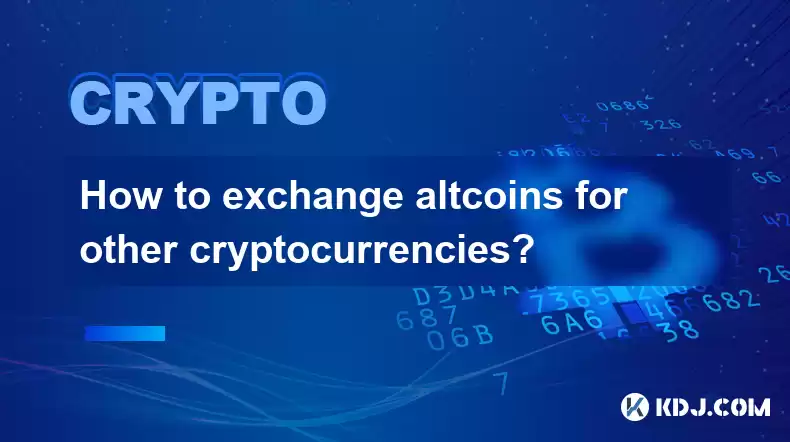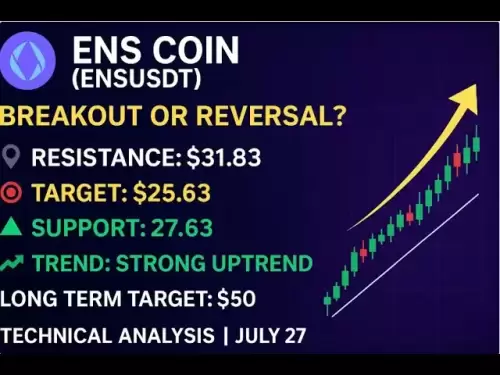-
 Bitcoin
Bitcoin $117900
0.31% -
 Ethereum
Ethereum $3766
0.28% -
 XRP
XRP $3.176
-0.31% -
 Tether USDt
Tether USDt $1.000
0.00% -
 BNB
BNB $795.6
1.51% -
 Solana
Solana $186.8
-1.09% -
 USDC
USDC $0.9999
-0.01% -
 Dogecoin
Dogecoin $0.2353
-1.33% -
 TRON
TRON $0.3226
1.49% -
 Cardano
Cardano $0.8172
-1.08% -
 Sui
Sui $4.178
3.06% -
 Hyperliquid
Hyperliquid $43.05
-3.39% -
 Stellar
Stellar $0.4367
-0.57% -
 Chainlink
Chainlink $18.62
1.47% -
 Hedera
Hedera $0.2828
6.63% -
 Bitcoin Cash
Bitcoin Cash $584.7
5.65% -
 Avalanche
Avalanche $24.81
2.53% -
 Litecoin
Litecoin $112.8
-0.88% -
 UNUS SED LEO
UNUS SED LEO $8.975
-0.08% -
 Shiba Inu
Shiba Inu $0.00001395
-1.07% -
 Toncoin
Toncoin $3.285
-1.05% -
 Ethena USDe
Ethena USDe $1.001
0.01% -
 Polkadot
Polkadot $4.123
0.76% -
 Uniswap
Uniswap $10.49
-0.18% -
 Monero
Monero $326.5
0.14% -
 Dai
Dai $0.9999
-0.02% -
 Bitget Token
Bitget Token $4.576
0.34% -
 Pepe
Pepe $0.00001247
-1.55% -
 Cronos
Cronos $0.1400
3.77% -
 Aave
Aave $295.1
-0.73%
How to exchange altcoins for other cryptocurrencies?
By understanding the concept of altcoins and identifying reliable exchange platforms, traders can leverage the potential benefits of exchanging alternative cryptocurrencies, while mitigating associated risks.
Jan 06, 2025 at 07:06 am

Key Points:
- Understanding the concept of altcoins and their significance in the cryptocurrency ecosystem.
- Identifying suitable platforms for exchanging altcoins, considering factors such as fees, security, and liquidity.
- Step-by-step guide on how to initiate an altcoin exchange, including account setup and order placement.
- Exploring advanced trading strategies for leveraging altcoin exchanges, such as limit orders and market orders.
- Managing risks associated with altcoin exchanges, including volatility and potential security breaches.
How to Exchange Altcoins for Other Cryptocurrencies
1. Understanding Altcoins and their Significance
Altcoins, an abbreviation for alternative coins, are cryptocurrencies other than Bitcoin. They offer diverse functionalities, such as enhanced privacy, fast transaction speeds, and decentralized governance. Altcoins play a substantial role in the cryptocurrency landscape by introducing innovation and expanding the utility of blockchain technology.
2. Identifying Suitable Altcoin Exchange Platforms
Choosing a suitable altcoin exchange platform is crucial for secure and efficient trading. Factors to consider include:
- Fees: Exchanges charge varying fees for transactions, such as trading fees, deposit fees, and withdrawal fees. Compare fees to optimize cost efficiency.
- Security: Evaluate the platform's security measures, including two-factor authentication, cold storage, and insurance coverage. Ensure your funds are protected.
- Liquidity: Liquidity refers to the availability of buyers and sellers for a particular altcoin. A highly liquid exchange ensures easy and timely execution of trades.
- Reputation and Trust: Consider the reputation of the exchange within the cryptocurrency community. Read reviews and consult trusted sources to assess reliability.
3. Setting Up an Exchange Account
To initiate altcoin exchanges, you must register for an account on the chosen platform. This typically involves providing personal information, verifying your identity, and setting up two-factor authentication for enhanced security.
4. Funding Your Account
Most altcoin exchanges allow funding your account using fiat currencies (e.g., USD, EUR) or other cryptocurrencies. Choose the preferred funding option based on availability, fees, and transaction processing times.
5. Placing an Altcoin Exchange Order
To exchange altcoins, you need to create an order specifying the altcoin you wish to sell, the altcoin or cryptocurrency you want to acquire, and the quantity. You can choose between two primary order types:
- Limit Order: Execute the trade at a predefined price, either above or below the current market price. This order type provides more control over trade execution but may result in slower execution if the market price doesn't reach your specified price.
- Market Order: Execute the trade immediately at the best available market price. This order type ensures instant execution but may result in a slightly less favorable price than a limit order.
6. Managing Altcoin Exchanges
Once the order is placed, you can track its progress in the "Orders" section of the exchange platform. You can modify or cancel orders before execution, depending on the platform's policies.
7. Receiving Exchanged Altcoins
Upon successful execution, the exchanged altcoins or cryptocurrency will be deposited into your account on the exchange platform. You can then withdraw them to a hardware wallet or another exchange for further trading or storage.
FAQs:
Q: What are the benefits of exchanging altcoins?
A: Altcoin exchanges offer several benefits, including:
- Diversify cryptocurrency portfolio
- Gain exposure to emerging or promising cryptocurrencies
- Trade cryptocurrencies with different features or functionalities
Q: Are all altcoins worth investing in?
A: Not all altcoins are worth investing in. Conduct thorough research to assess the value proposition, team behind the project, and market demand before allocating funds.
Q: What are the risks associated with altcoin exchanges?
A: Altcoin exchanges come with inherent risks, such as:
- Volatility
- Security breaches
- Exchange failure or closure
Q: How to minimize risks while exchanging altcoins?
A: Minimize risks by following these practices:
- Store cryptocurrencies in a secure hardware wallet
- Use reputable and well-established exchange platforms
- Diversify altcoin investments to spread risk
- Monitor market trends and news to stay informed
Disclaimer:info@kdj.com
The information provided is not trading advice. kdj.com does not assume any responsibility for any investments made based on the information provided in this article. Cryptocurrencies are highly volatile and it is highly recommended that you invest with caution after thorough research!
If you believe that the content used on this website infringes your copyright, please contact us immediately (info@kdj.com) and we will delete it promptly.
- Crypto ETFs and Altcoins: Navigating the Wild West with Meme Coins and Tokenized Assets
- 2025-07-27 23:04:06
- Bitcoin Price, Portfolio Growth, and the Remittix Alternative: Navigating the Crypto Landscape
- 2025-07-27 23:04:06
- Cryptos to Watch in 2025: Punisher Coin, Chainlink, and the Altcoin Arena
- 2025-07-27 18:30:13
- Bitcoin, Altcoins, Rebound: Navigating the Crypto Comeback Trail
- 2025-07-27 18:30:13
- Ethereum, Bitcoin, and Altcoins: A Shift in Crypto Tides?
- 2025-07-27 19:10:13
- Windtree Therapeutics' Bold BNB Strategy: A $520 Million Crypto Play
- 2025-07-27 19:10:13
Related knowledge

What is Chainlink (LINK)?
Jul 22,2025 at 02:14am
Understanding Chainlink (LINK): The Decentralized Oracle NetworkChainlink is a decentralized oracle network designed to bridge the gap between blockch...

What is Avalanche (AVAX)?
Jul 22,2025 at 08:35am
What is Avalanche (AVAX)?Avalanche (AVAX) is a decentralized, open-source blockchain platform designed to support high-performance decentralized appli...

What is Polkadot (DOT)?
Jul 19,2025 at 06:35pm
Understanding the Basics of Polkadot (DOT)Polkadot (DOT) is a multi-chain network protocol designed to enable different blockchains to transfer messag...

What is Litecoin (LTC)?
Jul 23,2025 at 11:35am
Overview of Litecoin (LTC)Litecoin (LTC) is a peer-to-peer cryptocurrency that was created in 2011 by Charlie Lee, a former Google engineer. It is oft...

What is Monero (XMR)?
Jul 21,2025 at 10:07am
What is Monero (XMR)?Monero (XMR) is a decentralized cryptocurrency designed to provide enhanced privacy and anonymity for its users. Unlike Bitcoin a...

How to add indicators to Ethereum chart on TradingView?
Jul 19,2025 at 07:15am
What Is an Ethereum Chart on TradingView?The Ethereum chart on TradingView is a visual representation of the price movement of Ethereum (ETH) over a s...

What is Chainlink (LINK)?
Jul 22,2025 at 02:14am
Understanding Chainlink (LINK): The Decentralized Oracle NetworkChainlink is a decentralized oracle network designed to bridge the gap between blockch...

What is Avalanche (AVAX)?
Jul 22,2025 at 08:35am
What is Avalanche (AVAX)?Avalanche (AVAX) is a decentralized, open-source blockchain platform designed to support high-performance decentralized appli...

What is Polkadot (DOT)?
Jul 19,2025 at 06:35pm
Understanding the Basics of Polkadot (DOT)Polkadot (DOT) is a multi-chain network protocol designed to enable different blockchains to transfer messag...

What is Litecoin (LTC)?
Jul 23,2025 at 11:35am
Overview of Litecoin (LTC)Litecoin (LTC) is a peer-to-peer cryptocurrency that was created in 2011 by Charlie Lee, a former Google engineer. It is oft...

What is Monero (XMR)?
Jul 21,2025 at 10:07am
What is Monero (XMR)?Monero (XMR) is a decentralized cryptocurrency designed to provide enhanced privacy and anonymity for its users. Unlike Bitcoin a...

How to add indicators to Ethereum chart on TradingView?
Jul 19,2025 at 07:15am
What Is an Ethereum Chart on TradingView?The Ethereum chart on TradingView is a visual representation of the price movement of Ethereum (ETH) over a s...
See all articles

























































































